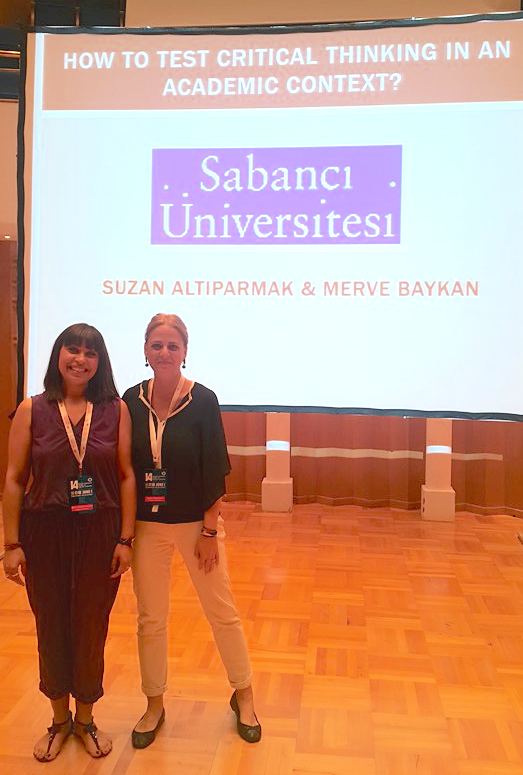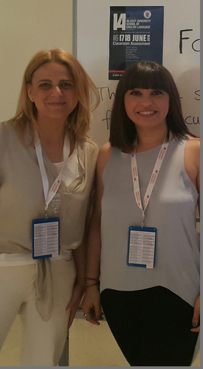14th INTERNATIONAL BILKENT UNIVERSITY SCHOOL OF ENGLISH LANGUAGE CONFERENCE
14th INTERNATIONAL BILKENT UNIVERSITY SCHOOL OF ENGLISH LANGUAGE CONFERENCE
A review by Merve Baykan & Suzan Altıparmak

On 16th, 17th and 18th of June, Bilkent University hosted their 14th International Conference on Classroom Assessment, where the plenary speakers were Prof. Giray Berberoğlu, Prof. Anthony Green, Steve Ferrera, Dr. Neus Figueras, Prof. Barry O’sullivan, and Prof. Emeritus Sauli Takala.
 Classroom Assessment: Major Challenges and Key Components by Prof. Giray Berberoğlu
Classroom Assessment: Major Challenges and Key Components by Prof. Giray Berberoğlu
Professor Berberoğlu talked about formative assessment as being a need of the society because it has the capability of providing continuous feedback to teachers. In his research, he has targeted individual development; the standard deviation after improvement upon feedback was 0.41, which is a remarkable result. He also referred to Bloom’s Taxonomy and emphasized the importance of higher order thinking skills which in his context are: prestructural, unistructural, multistructural, relational and extended abstract versus memorization. He also discussed that no matter what feedback technique they used, they focused on two cognitive processes, which are retrieval and higher order. Berberoğlu also claimed that “improving learning achievement of students through formative tests can be effective if higher order thinking skills are more emphasized in teaching and assessment tools. The teachers’ role regarding this claim is a technical one, beyond the ability of teacher made tests. He then mentioned “the learning trajectory” for effective formative assessment and focused on four key elements for successful feedback:
• Elaborate but not too complex
• Specific to the learning task
• Avoid general praise
• Different for different learners
How Can We Use Assessment to Facilitate Learning? by Peter Davidson
In his session, Peter Davidson discussed the amount of test given at schools in terms of achievement, motivation and washback effect. He quoted from (Earl, 2013) to give the following distinctions among different types of assessment:
• Assessment of learning: summative, teacher-centered, judgmental, results expressed as grades
• Assessment for learning: emphasis on formative assessment more interactive, teacher focused on identifying learning needs
• Assessment as learning: student role is key: “as active, engaged and critical assessors, can make sense of the information, relate it to prior knowledge, and master the skills involved”
Taking these into consideration, Davidson discussed learning oriented assessment versus how assessment can facilitate learning.
Assessment Based on Multiple Intelligences in a Reading and Writing EFCL by Sara Nidhya Camacho Estrada
In her session, Estrada discussed the cultural difference snot being taken into consideration in International Exams. She claimed that implicit characteristics of cultural values should be taken into account when assessing. She gave examples from her native language Kichwa, where there is no concept of present perfect tense. She also suggested that many people from Latin America express themselves indirectly, while Americans are always more direct and straightforward. Even these two issues, she suggested, cause students taking International exams like IELTS, TOEFL and GMAT to be marginalized. She quoted from UNESCO, saying that “There is an urgent need to invest in cultural diversity and dialogue” to be fair to everyone. Her conclusion was to teach through multiple intelligences and high order thinking skills, so that learners can cope in different situations and exams with more success.
The Role of Classroom Discussion in Developing Academic Knowledge and Skills – and Language Proficiency by Steve Ferrera
In his plenary, Ferrera focused on the importance of classroom discussions and how often they were ignored in teaching contexts. He suggested that there are 5 core classroom discussion skills, which are: elaborate and clarify, support ideas with examples, paraphrase, synthesize and build on / challenge ideas, in order to prepare students both for academic discussions and workplace conversations. He recommends using formative assessment to test speaking so that more elaborate is provided to the students. He also emphasized the importance of rubrics as they give a clear guide to the students. Ferrera also talked about an interactive conversational proficiency practice and learning system namely DLL – Dialogue for Language Learners which can be accessed from www.mylanguageexchange.com
What Testers Can Learn From Games by Robin Turner
In this presentation Turner likened computer games to exams. He showed the audience that, just like tests, online computer games have rules, a grading system and a feedback system. He also pointed out that such games usually offer even a more structured and solid testing environment in which students can get constant feedback flow. Feedback can at times be interactive. Furthermore, in the realm of games, there is not just one standard answer key per se. That is, there are more than one way to achieve success; more than one path to win, which makes games more personalized in the way they test. Games also cater better for students’ motivation to succeed with the help of features one cannot find in standard testing, such as bonus points, power-ups and epic wins. Considering motivation to be a key component of success, Turner suggested ways to apply the benefits of online game design principles to classroom testing.
How is Alternative Assessment Related with Language Teacher’s Self – Efficacy? by Pınar Kahveci & Yeliz Yazıcı
This presentation was about the findings of a study conducted among teachers from a diverse variety of locations about how they perceive their own efficiency as teachers and users of English. The subjects were teaching young learners from 1st grade to 4th grade. A link was drawn between teachers’ perceived self - efficiency and how much they exploit alternative testing methods in the classroom. The findings yielded interesting results. According to this study, there is a positive correlation between how high teachers rate their self-efficacy and how much they use alternative testing methods. Another interesting finding was that female teachers rated themselves as more efficient as they got older whereas male teachers rated themselves higher in terms of self efficiency when they were novices and their perceived self efficiency declined as their age got older. In other words, older female teachers see themselves as more efficient while the opposite is true for male teachers. The presentation ended with a crucial side note though. Apparently, use of alternative assessment at elementary schools is no longer supported by the Ministry of Education.
